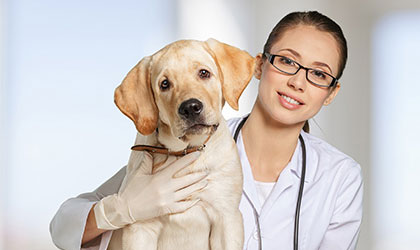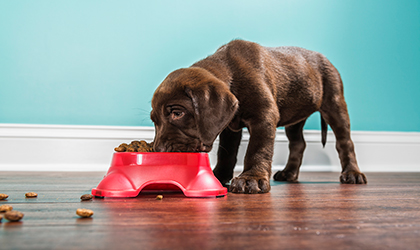
Keeping cats in at night
Cats are natural-born, nocturnal hunters, meaning they unleash their predatory streak at night. Thanks to this evolutionary characteristic, some studies suggest felines find themselves in more traffic accidents. In light of this, we’d recommend keeping kitty indoors at night to protect him from the perils of the roads. If, however, your feline friend becomes restless, entertain him with plenty of toys, climbing frames and puzzle feeders.
Neutering male cats dispels the urge to roam and they'll settle more happily at night too.
Dogs on leads
Although exercising your pooch is central to his overall wellbeing, dog walking comes with one major provision: you should only let your canine off the lead if 1) you can keep him under control and 2) he has good recall. New changes in the law mean you could even face a £100 fine for not keeping your dog on a lead on public roads, pavements and verges, so pay close attention when you’re out and about.
As an owner, you have a moral and legal obligation to safeguard the creatures in your care. it is your sole responsibility to protect them against disease, suffering and pain. to uphold your side of the bargain then, you need to be prepared for all the weird and wonderful curveballs everyday life can throw at you.
Foods to avoid
There are a number of foods your furry friends need to keep their curious little noses away from. As tempting as it may be, never share these treats with your dog or cat – many will cause unpleasant digestive issues and could even prove fatal.
-
Chocolate
-
Caffeine
-
Grapes and raisins
-
Onions and garlic
-
Flowers such as lilies (are poisonous)
-
Alcohol
-
Macadamia nuts
-
Foods containing xylitol – an artificial sweetener
Moving house checklist
Your canine and feline friends can become very attached to their territory, so you can imagine how disorientating and disruptive moving house can be for them. Fortunately, it doesn’t have to be such a tail-spinning ordeal for your pets if handled correctly.
-
Prepare an ‘overnight bag’ for your pets that’s well stocked with enough litter, dog food, grooming tools and toys to keep them comfortable for the first few days of the move. Make sure the bag is easily-accessible too.
-
The best way to reduce stress during the move itself is by keeping your pet in the quietest area of your new house. Surround him with familiar toys, blankets and plenty of water. Quite simply, make him feel at home as much as possible.
-
In the midst of all the chaotic box unpacking, you should try to maintain a sense of routine for your four-pawed companion. Try to walk and feed him at the times you usually would.
-
Once you’ve settled into your new home, make sure you update your pet’s microchip information.
-
Keep your cat in for 3 weeks after the ‘move’, (with fresh food/water and a litter tray).
-
Consider a plug-in such as FELIWAY®, which encourages cats to feel happy in our modern environment and helps avoids signs like urine spraying, scratching, fighting and hiding.
Fireworks
Fireworks can be the stuff of nightmares for animals. They can send skittish cats jumping and tentative pups cowering. So how can you reduce the blow (literally) for terrified pets?
-
Always walk your dog well before fireworks are due to begin
-
Don’t handle cats if they’re scared; they prefer to control how they cope in stressful situations (no surprises there!)
-
Keep all doors, windows, pet flaps and curtains tightly shut
-
Play music with a repetitive beat to help disguise the sound of loud bangs
-
Some owners create a cosy ‘den’ to make dogs feel safe
-
If your furry friend is accustomed to seeking reassurance from you in stressful situations, comfort him as usual.
-
Stay calm. Keep your mood, behaviour and tone as normal as possible. If you become anxious, this will only exacerbate how unsettled your pet feels.
-
Never punish your pets; it’s not their fault they’re scared!
You Might Also Like

Keri
Keri Filtness has worked in the Nutrition Industry for 19 years. She is regularly called upon for her professional comments on health and nutrition related news. Her opinions have been featured by BBC3, Prima, Vitality, The Mirror, Woman’s Own and Cycling Weekly, amongst others. She has also worked one to one with journalists, analysing their diets and health concerns and recommending changes and additions, where appropriate.
View More



